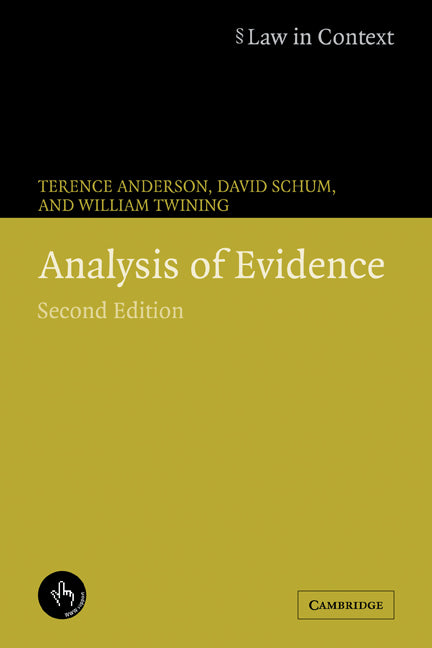Freshly Printed - allow 8 days lead
Couldn't load pickup availability
Analysis of Evidence
A book for undergraduate and postgraduate courses on evidence and proof, and on legal method.
Terence Anderson (Author), David Schum (Author), William Twining (Author)
9780521673167, Cambridge University Press
Paperback, published 11 July 2005
436 pages
22.8 x 15.4 x 2.8 cm, 0.585 kg
This extensively revised second edition is a rigorous introduction to the construction and criticism of arguments about questions of fact, and to the marshalling and evaluation of evidence at all stages of litigation. It covers the principles underlying the logic of proof; the uses and dangers of story-telling; standards for decision and the relationship between probabilities and proof; the chart method and other methods of analyzing and ordering evidence in fact-investigation, in preparing for trial, and in connection with other important decisions in legal processes and in criminal investigation and intelligence analysis. Most of the chapters in this new edition have been rewritten; the treatment of fact investigation, probabilities and narrative has been extended; and new examples and exercises have been added. Designed as a flexible tool for undergraduate and postgraduate courses on evidence and proof, students, practitioners and teachers alike will find this book challenging but rewarding.
1. Evidence and inference: some food for thought
2. Fact investigation and the nature of evidence
3. Principles of proof
4. Methods of analysis
5. The chart method
6. Outlines, chronologies and narrative
7. Analysing the decided case: anatomy of a cause célèbre
8. Evaluating evidence
9. Probabilities, weight and probative force
10. Necessary but dangerous: generalizations and stories in argumentation about facts
11. The principles of proof and the law of evidence
12. The trial lawyer's standpoint.
Subject Areas: Constitutional & administrative law [LND], Civil procedure: law of evidence [LNAC3], Civil procedure, litigation & dispute resolution [LNAC], Legal skills & practice [LAS]


